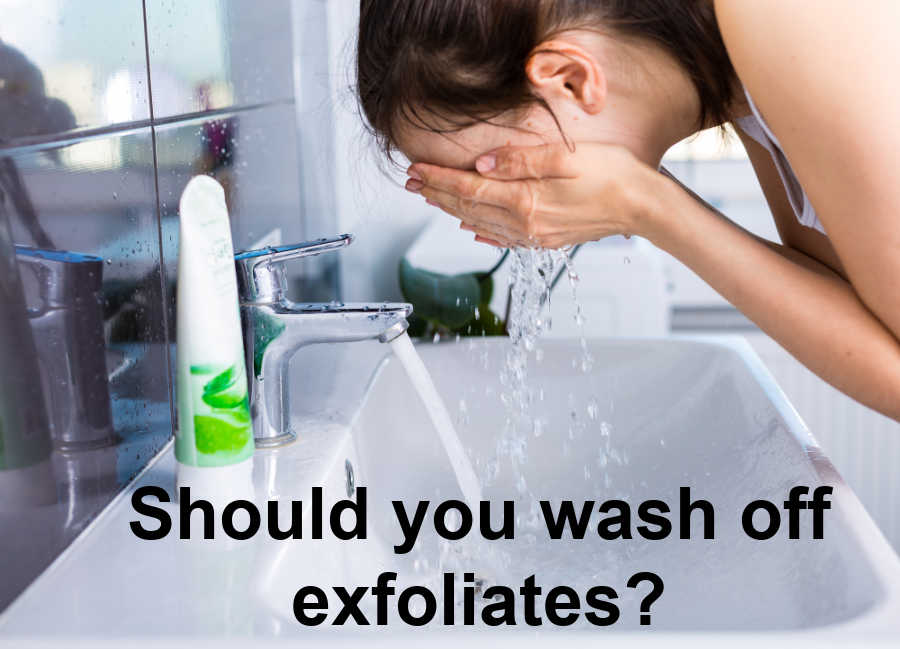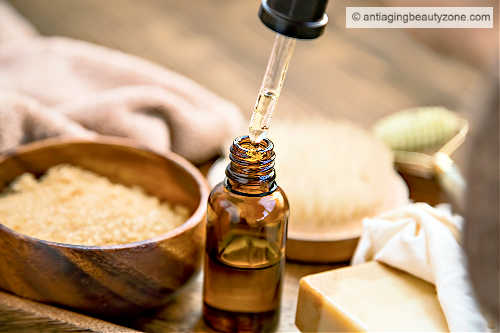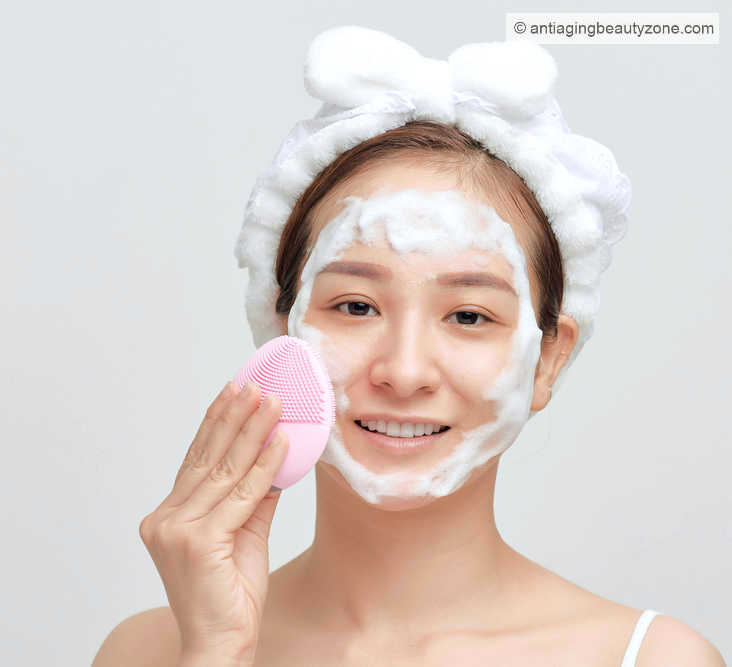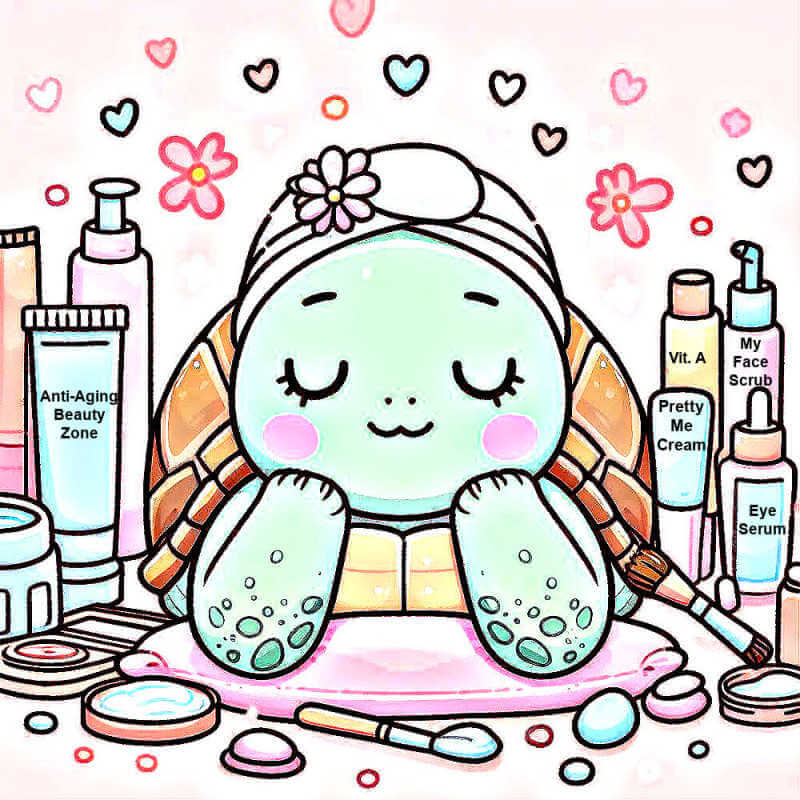- Home
- Exfoliation Guide
- Do You Wash Exfoliate Off
I may earn from qualified Amazon & Affiliate purchases at no cost to you.
When do You Wash Exfoliates Off? Avoid these common mistakes
by: Linda Robison / Facial Fitness Specialist @ ABZ
Should You Wash Exfoliates Off or Leave Them On?
Exfoliation is key to achieving smooth, glowing skin, but deciding whether to wash off or leave on can be confusing. The right approach depends on the exfoliant type, your skin type, and product instructions.
This Anti-Aging Beauty Zone guide explains when to wash off exfoliates and when to leave them on, so you can achieve the best results for your skin.

Is exfoliation necessary
Yes! If you want smooth, glowing, glass skin. Exfoliation is a crucial part of any skincare routine. It aids in the removal of dead skin cells, unclogs pores, supports collagen production, reduces the look of fine lines, and reveals fresh radiant skin.
However, understanding when to wash off and when to leave on exfoliates poses challenges that often depend on the type of exfoliant used, the user's skin type, and the product's specific instructions.
Alright, let's dive a bit deeper into the world of exfoliants! So, there are two main types: physical and chemical. Here's the lowdown on each:
PHYSICAL VS CHEMICAL EXFOLIATION: WHICH SHOULD YOU CHOOSE

When it comes to exfoliation, your choice between physical and chemical exfoliants depends on your skin type and personal preference.
Physical Exfoliants:
These include sugar scrubs, brushes, or sponges. They provide instant results by physically sloughing off dead skin cells through manual exfoliation. Always wash them off after use to avoid irritation. They’re ideal for those with tougher skin but can be too harsh for sensitive skin.
Chemical Exfoliants:
Gentle chemical exfoliants like serums and masks use acids or enzymes to dissolve dead skin cells. They offer a gentler, deeper exfoliation. Some chemical exfoliants can be left on the skin to continue working, while others should be washed off after a specific period. Check the product instructions to determine the best approach for your skin.
Key Differences: When to Wash Off and When to Leave On
Physical Exfoliants:
Always wash these off after use to prevent irritation and ensure a smooth, clear complexion. Manual exfoliation tools and scrubs are designed to be rinsed off after use to avoid over-exfoliation and skin sensitivity.
Chemical Exfoliants:
Some chemical exfoliants can be left on the skin to continue working, providing deeper exfoliation and long-lasting effects, while others need to be rinsed off. For optimal results, follow the product instructions for each type of acidic exfoliant or enzyme treatment to match your skin’s needs.
Which exfoliation process is better?
When it comes to choosing between physical and chemical exfoliants, it really depends on your skin type and preference.
If you like instant results and have tougher skin, you might lean towards physical exfoliants. But if you have sensitive skin or prefer a gentler approach, chemical exfoliants might be your best bet.
Note: For my normal skin, I switch up exfoliants to keep things effective. One week, I'll use a physical scrub, and the next, I'll switch to a lactic acid serum. This approach helps me maintain smooth, radiant skin. It's key to experiment and see what works best for you.
Consider your skin type for best results

So, when it comes to choosing between physical and chemical exfoliants, it really depends on your skin type and personal preference.
If you like instant results, and you're not the sensitive type, you might lean towards physical exfoliants. But if you have a delicate complexion or prefer a gentler approach, chemical exfoliants might be your best bet.
Best experience: Consider your skin type
For those with normal or oily skin, they can handle a bit more when it comes to exfoliation. Many can switch between both chemical and manual exfoliation products without issues.
But those with sensitive skin conditions have to be careful. If they use something too rough, like a gritty scrub, their might experience redness or irritation. If you're a sensitive type, consider starting out with a gentle exfoliating cleanser.
Figuring out what works for your skin type is like a little experiment. You might have to try different things to see what your skin likes best.
common exfoliation mistakes and how to avoid them
Avoid these mistakes to ensure your exfoliation routine keeps your skin healthy and glowing.
1. Over-Exfoliating: Stripping skin of natural oils. Avoid: Exfoliate 1-2 times a week; reduce use if irritation occurs.
2. Using Harsh Exfoliants: Damaging sensitive skin. Avoid: Opt for gentle scrubs or soft brushes. Be gentle.
3. Ignoring Instructions: Reduced effectiveness or irritation. Avoid: Follow product instructions carefully.
4. Mixing Too Many Exfoliants: Overwhelming your skin. Avoid: Use one type per day and alternate throughout the week.
5. Exfoliating Broken Skin: Worsening irritation. Avoid: Skip exfoliation on broken or inflamed skin.
6. Neglecting Moisturization: Drying out skin. Avoid: Apply a moisturizer after exfoliating.
Final takeaway:
So, knowing when to leave on or wash off exfoliants on depends on the type of product used and your complexion.
Just keep this in mind: As a General Rule of Thumb
Physical exfoliants should always be washed off, while some chemical exfoliants can be left on according to the product instructions. Always patch test and follow instructions to avoid irritation, and use sunscreen to protect your skin from UV damage.
About the Author:
Linda Robison is a Facial Fitness Specialist and the founder of Anti-Aging Beauty Zone. She shares expert insights on skincare, facial rejuvenation, and beauty treatments—blending traditional wisdom, personal experience, and science-backed research for both at-home and in-office solutions.
Before you go ....
Please tap on the💙in the bottom right corner if you found this page helpful. Also, Let’s CONNECT! Click the buttons below to follow me on social media.
Thanks so much!

